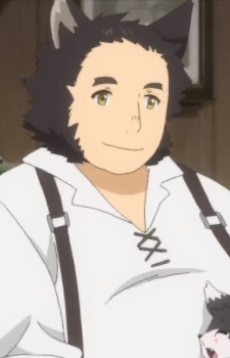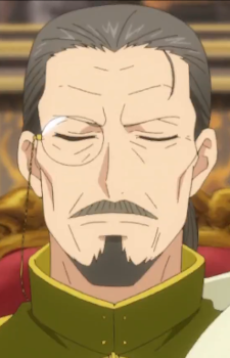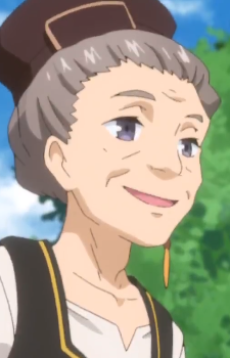
If It’s for My Daughter, I’d Even Defeat a Demon Lord Hindi Subbed [12/12] {Complete}

Uchi no Ko no Tame Naraba, Ore wa Moshikashitara Maou mo Taoseru Kamo Shirenai.
If It's for My Daughter, I'd Even Defeat a Demon LordSynopsis
Dale is a cool, composed, and highly skilled adventurer who’s made quite a name for himself despite his youth. One day on a job deep in the forest, he comes across a little devil girl who’s almost wasted away. Unable to just leave her there to die, Dale takes her home and becomes her adoptive father. Devil or not, Latina is beyond adorable, and the adventurer soon finds himself head over heels with being a parent. But why was she out in the forest to begin with, and why does she carry the mark of a criminal? (Source: J-Novel Club)
Watch Trailer
Characters
Echoes of Adoption: The Unbreakable Bond Forged in Shadows
In the verdant depths of a perilous forest, where the air hums with the whispers of ancient magic and the distant roars of mythical beasts, an unlikely encounter reshapes destinies. Dale Reki, a seasoned adventurer at the tender age of eighteen, stumbles upon a frail figure huddled among the underbrush—a young devil girl named Latina, her once-proud horn shattered, marking her as an outcast in her own kind’s unforgiving society. This moment, depicted with crystalline clarity in the opening episode, sets the stage for a narrative that transcends typical fantasy tropes. Directed by Yūji Yanase and animated by Maho Film, the series unfolds as a tapestry of quiet introspection and profound emotional growth, airing its twelve episodes from July to September 2019. What emerges is not a saga of grand battles against demonic overlords—as the title might coyly suggest—but a deeply intimate exploration of guardianship, prejudice, and the quiet heroism found in everyday acts of compassion.
Whispers of the Devil’s Tongue: Latina’s Hidden Heritage Unveiled
Latina’s introduction is a masterstroke of character design, her wide emerald eyes and ribbon-adorned horns evoking a blend of vulnerability and latent strength that immediately captivates. Voiced with ethereal innocence by Kanon Takao in the Japanese track and Cristina Vee in the English dub, she embodies the series’ core theme: the reclamation of identity amid societal rejection. The broken horn, a symbol of criminality among devils, hints at a backstory shrouded in tragedy, though Season 1 wisely parcels out revelations sparingly, allowing her gentle nature to shine through first. As Dale communicates with her in the devils’ arcane language—revealed to be the root of human spellcasting—the episode cleverly weaves world-building into their interaction, establishing a shared linguistic bridge that underscores themes of cross-cultural understanding. This linguistic nuance, drawn faithfully from Chirolu’s light novel, elevates the fantasy elements beyond mere backdrop, making the devil realm feel like a parallel society with its own intricate laws and stigmas.
Crossroads of Care: Dale’s Transformation from Wanderer to Warden
Dale, brought to life with a stoic yet warm performance by Nobuhiko Okamoto (and Kaiji Tang in English), starts as the archetype of the lone wolf adventurer—respected in the bustling city of Kreuz for his prowess against magical beasts. Yet, his decision to adopt Latina marks a pivotal shift, transforming him from a solitary figure into a reluctant patriarch. The series excels in portraying this evolution through subtle domestic vignettes: teaching her the common tongue, navigating her first market outing, or simply sharing meals at the Dancing Tabby Cat inn. These scenes, animated with fluid, expressive motions that highlight Dale’s softening gaze, reveal his internal conflicts—balancing perilous quests with the ache of separation from his new charge. A particularly poignant arc involves Latina’s enrollment in school, where a prejudiced instructor’s cruelty forces Dale to confront not just external threats, but the systemic biases that endanger his family. This narrative thread, absent in more action-heavy fantasies, grounds the story in realistic emotional stakes, drawing parallels to real-world issues of adoption and discrimination without ever feeling didactic.
Ribbons and Revelations: The Inn’s Ensemble and Everyday Enchantments
The supporting cast at the Dancing Tabby Cat adds layers of warmth and realism to the proceedings, turning the inn into a microcosm of Kreuz’s diverse society. Rita, the sharp-witted proprietress voiced by Manami Numakura (Jeannie Tirado in English), serves as a surrogate aunt, her no-nonsense demeanor masking a deep well of empathy as she aids in disguising Latina’s horns with ribbons. Her husband Kenneth provides comic relief through his bumbling yet heartfelt attempts at childcare, while their daughter sows seeds of future friendships. These interactions, often set against the inn’s cozy, lantern-lit interiors, showcase the series’ strength in slice-of-life pacing—episodes meander through festivals, errands, and quiet evenings, allowing character bonds to deepen organically. One standout sequence involves Latina’s budding popularity among patrons, her clumsy attempts at singing revealing a charm that disarms even the gruffest adventurers. The animation here employs soft color palettes and intricate background details, like the flickering candlelight on wooden beams, to evoke a sense of lived-in comfort, making the inn feel like a sanctuary amid the world’s harsher edges.
Shadows of Isolation: Confronting Prejudice and the Weight of Immortality
As the season progresses, darker undercurrents surface, adding depth to what could have been mere fluff. Latina’s self-doubt manifests in a harrowing episode where she grapples with her “otherness,” culminating in a suicide attempt that shocks with its raw intensity—a rare moment of gravity in a genre often accused of superficiality. This scene, handled with restraint through close-up shots of her tear-streaked face and trembling hands, explores the psychological toll of rejection, including a visit to her father’s grave that unearths fragments of her past. Dale’s response—rushing to her side post-quest—highlights his growing paternal instincts, but also introduces the looming specter of devils’ extended lifespans, foreshadowing the heartache of outliving loved ones. Prejudice rears its head through encounters with wary townsfolk and the aforementioned teacher, whose bigotry forces a confrontation that tests Dale’s restraint. These elements, informed by the light novel’s early volumes, prevent the series from devolving into saccharine territory, instead offering a nuanced look at resilience and the fight against ingrained biases in a fantastical setting.
Harmonies of Heart: Soundscapes and Visual Poetry in Motion
The auditory and visual craftsmanship elevates the emotional beats to symphonic heights. The opening theme, “Latina” by Maaya Uchida, blends upbeat folk melodies with wistful undertones, mirroring the duo’s journey from uncertainty to harmony. Ending credits feature a tender ballad that often accompanies montages of daily life, reinforcing the series’ emphasis on quiet joys. Sound design shines in subtle ways: the rustle of leaves during forest scenes, the clatter of utensils in the inn, or the ethereal hum of magic spells, all contributing to an immersive atmosphere. Visually, Maho Film’s style—crisp lines, vibrant yet muted colors for the human world contrasting the ethereal glow of devil magic—captures the duality of Latina’s heritage. Episode 6’s festival sequence, with fireworks illuminating her joyful expression, stands as a pinnacle of visual storytelling, where light and shadow play across faces to convey unspoken affections. These technical aspects, rarely overhyped, ensure that even static dialogue scenes pulse with life, making the series a feast for the senses.
Threads of Time: Pacing, Twists, and the Promise of Horizons Unseen
Season 1’s structure masterfully balances episodic charm with serialized progression, clocking in at twelve episodes that feel neither rushed nor padded. Early arcs focus on acclimation—Latina’s language lessons and Dale’s guild obligations—building to mid-season emotional peaks like the school incident, before resolving in a heartfelt finale that ties up immediate threats while teasing larger mysteries. Twists, such as the revelation of Latina’s royal devil lineage or Dale’s acquisition of a devil’s longevity through their bond, are introduced organically, avoiding info-dumps through character-driven dialogue. The pacing falters slightly in filler-like side stories, such as extended inn antics, but these serve to humanize the cast, revealing quirks like Rita’s hidden scholarly side. Critically, the season ends on a note of tentative peace, with Dale and Latina’s family solidified, yet the title’s “demon lord” promise lingers unfulfilled, hinting at epic confrontations in potential future adaptations. This restraint keeps the focus on personal growth, making the narrative feel like a lived experience rather than a checklist of fantasy clichés.
Echoes Beyond the Screen: Legacy and Lingering Impressions
Reflecting on Season 1, “If It’s for My Daughter, I’d Even Defeat a Demon Lord” emerges as a beacon of heartfelt storytelling in a crowded genre, its 7.0 IMDb rating and positive MyAnimeList scores underscoring a dedicated fanbase drawn to its purity of emotion. While some critique the overt cuteness or subtle romantic undercurrents in later light novel developments, the anime maintains a chaste, familial core, emphasizing themes of acceptance that resonate universally. Its influence extends to discussions on adoption narratives, challenging comparisons to more controversial tales by grounding its fantasy in authentic vulnerability. For viewers seeking solace in tales of found family, this season delivers an unforgettable journey—one that lingers like the soft glow of a hearth fire, inviting contemplation on the lengths we’d go for those we cherish.




























